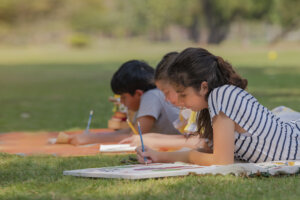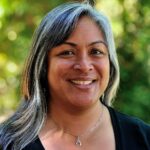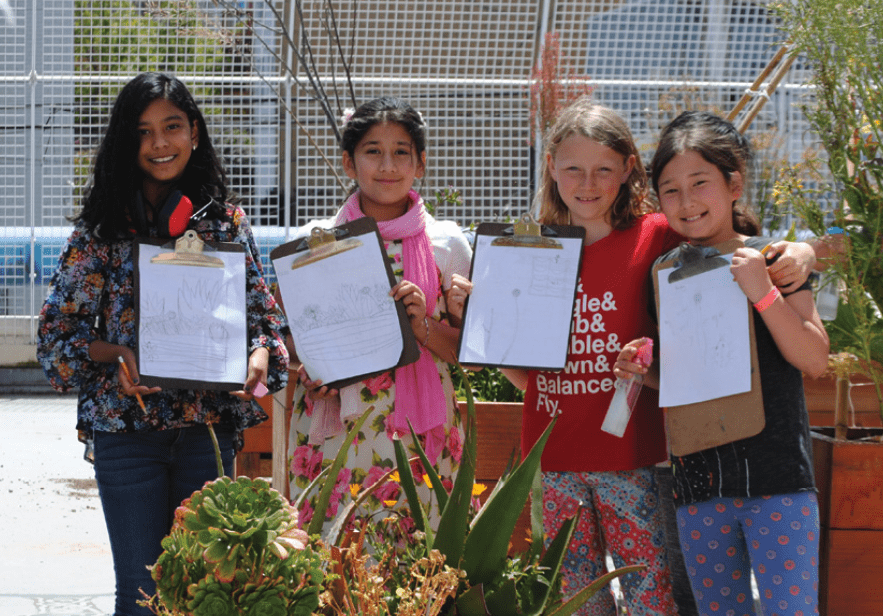For today’s young people, sustainability and climate are a top priority. For students, the environment holds the key to their futures, although schools are often ill-equipped to cultivate that connection. Environmental education and fostering a meaningful connection with nature are crucial pieces of preparing the next generation of young people for a resilient future.
Marie Bobias (she/her) is the director of environmental education at the Santa Clara County Office of Education, where she oversees operations for the Walden West Outdoor School & Summer Camp. In this insightful interview, Marie shares her experiences as a classroom teacher and how they inform her work as a director for the camp. Marie discusses the importance of equity in environmental education, detailing efforts to incorporate inclusive practices and ensure every student’s voice is heard and valued.
How did you come to be the director of environmental education for Walden West Science School and Summer Camp?
My parents, who immigrated from the Philippines, instilled in me a love for the outdoors and nature. I was born and raised in the Bay Area in Santa Clara, where my father took us to Half Moon Bay every summer. He was a sport fisher and loved exploring Martin’s Beach. These experiences introduced me to fishing, observing birds, and loving the ocean and tide pools.
In high school, I was part of a program called Montebello Ridge, where I participated in field biology for four years. During this program, we immersed ourselves in nature, developing outdoor skills like kayaking and canoeing on the Sacramento River. This experience further fueled my passion for the environment and ecology. Every summer, I also attended various summer schools that took me all over the north coast, from Redwood National Forests to Lassen.
My experiences as a youth learning outdoor skills with fellow high school students inspired me to become an educator. After obtaining my teaching credential from Humboldt State, I returned to Santa Clara County and struggled to find a job as a classroom teacher. While looking for a job, I discovered Walden West and became a field instructor for three years. Walden West introduced me to the idea of a science camp and the prospect of a career dedicated to that. Eventually, I transitioned into a classroom teacher and began working at different Title I schools. I worked my way up to become a lead science teacher before becoming the science coordinator for the Santa Clara Unified School District.
I worked with the Santa Clara District for about twenty-two years before I became an Educator-On-Loan for the Alameda County Office of Education, where I focused on science leadership and teacher training. Then the opportunity to return to Walden West presented itself, and it felt like things came full circle as I was welcomed back as the director. This time, I brought with me my diverse perspectives as a naturalist, classroom teacher, and leader. I now serve as the director of environmental education for Walden West, bringing my passion for nature, education, and science to inspire and empower the next generation of environmental enthusiasts.
And how do you feel like your experience as a classroom teacher helped inform the work that you’re doing now as a director and your position at the COE?
Being a classroom teacher allowed me to cultivate my love for science, and I was always looking for opportunities to take my students outside because that’s where my career started.
Something that stands out is when my fifth-grade class collaborated with the Audubon Society to petition the city to preserve the Ulistac Natural Area. As a result of their advocacy, the city set aside land for public recreation and as a flyover for migrating birds, which instilled in me a conscious commitment to environmental awareness in my teaching practices.
Further down the road in my teaching journey, at Peterson Middle School, the district gave me the opportunity to develop the curriculum for local students to experience field trips without having to travel far. Witnessing how accessible outdoor education positively impacted students’ learning experiences reaffirmed the value of utilizing natural environments as an extension of the classroom.
During my time as a classroom teacher and coordinator, I realized the importance of breaking free from the four walls and immersing students in nature. While building a strong sense of community and trust with the students is vital, I found that the outdoors offered invaluable learning opportunities that couldn’t be replicated inside a conventional classroom.
This perspective and hands-on experience have been instrumental in shaping my work as a director and my role at the COE. I continue to prioritize and advocate for outdoor education, emphasizing its role in fostering a deep understanding of subjects, building a connection with the environment, and cultivating a sense of responsibility for the world around us. My background as a classroom teacher has truly informed my approach to leadership, curriculum development, and promoting the importance of outdoor learning experiences for all students.
Can you describe the typical daily schedule for students attending the camp? How do you balance hands-on learning with exposure to new social settings and environments?
The mornings are structured with group activities, allowing the students to work together and socialize. We have found that after the pandemic, it’s even more important for campers to have time to interact and learn with their peers.
During the summer day camp, our eighth graders participate in a stewardship project where they gather in the garden to learn about the history of the land and the Indigenous people. Then they learn about invasive species and are tasked with identifying and removing them from the garden. This hands-on activity not only teaches them about the environment but also fosters discussions about the significance of the land and the Indigenous communities who once lived there. We encourage open dialogues about important topics, such as erasure, to broaden their understanding of history and culture.
For our younger students, we emphasize appreciating and exploring nature. They engage in critter hikes, where they learn about various critters, observe them, and ask questions to understand the ecosystem better. Additionally, we have a nature lab where they can have hands-on experiences, such as holding a snake for the first time. These sensory-based activities allow them to connect with nature on a deeper level, instilling a sense of wonder and appreciation for the natural world. Our goal is to spark a genuine connection to the environment to try and motivate youth toward becoming stewards of the natural world.
Can you speak a little bit about the importance of equity in how you’re making sure to incorporate equity in the programming?
Incorporating equity into our programming has been a significant component of our professional development initiatives. For several years now, we’ve had a book club where we dive into some great books about equity. Last year, we used some Educator Effectiveness funds so that we could do a lesson study that focused on equity and inclusion.
In one of our lessons, we focused on equity of voice among students. To do this, we first made it a point to explicitly inform the students that we were actively working toward ensuring everyone’s voice was heard and respected. Specifically, we focused on the importance of language in shaping learning environments and how we consider ways to communicate with our students more thoughtfully. For instance, we sought to avoid ableist language by replacing phrases like “walk and talk” with more inclusive alternatives like “pair share” or “thought swap.” This intentional language shift helped create a more welcoming and sensitive space for all students.
Challenges did arise during the process, especially when it came to working with experienced staff members who were accustomed to a more traditional teaching approach. However, we see the upcoming year as an opportunity to prioritize student-centered language discussions. Our aim is to move away from being the “sage on the stage” and instead empower students to be at the center of discussions, enabling them to take an active role in their learning journey.
In what ways has your participation in CAELI supported you in these efforts, or you in general in your role?
Being a part of the CAELI network has allowed me, as a community-based partner, to connect with others and be a part of a community of leaders working toward the same goal of environmental education. CAELI has given us some great tools for this community to come together and form partnerships, and formulate our visions for the county as environmental literacy leaders. The work we do is all about relationships, and CAELI helps provide a better view of what’s going on in other communities across the state.
During the pandemic, all of our programming was struggling as everyone had to suddenly pivot to virtual spaces. So having a network of environmental leaders was even more important to identify organizational needs and where opportunities for support were greatest. Most surprisingly, we formed a strong relationship with public health agencies in order to facilitate our camp safely. Sharing our experiences and plans with other community-based partners allowed them to adopt similar approaches and successfully run their programs as well.
What are you working on outside of the summer camp and outdoor science school? For the rest of the year when the camp isn’t in session?
Outside of the summer camp, I’m heavily involved in getting more gardens implemented across school districts. Over the past couple of years, we’ve been meeting virtually, and recently, we started conducting visits to school sites to support teachers and school districts with their gardens. Thanks to the Santa Clara County Office of Education’s strong support for school gardens, other districts are starting to pay more attention to this initiative.
One of our biggest accomplishments is the work that we are doing with the Union School District. Some students who attended the summer camp wanted to share what they’ve learned with their school administrators about food waste management. They even presented to their board of education. These particular students at Guadalupe Elementary School are just one of many stories of youth returning to their communities with newfound passion and knowledge about the environment.
We are also working with other districts that are developing sustainability plans and have established gardens. The biggest challenge right now is how to ensure every site has a dedicated garden coordinator. Fortunately, as a leader at Walden West, I was able to hire a garden specialist for our site, and my goal is to build up the program and establish an outreach initiative to partner with other schools and garden educators. We want to share our experiences and become a leading example in this area.
Our other goal is to establish a garden in South County to serve students and the community there, providing them with the opportunity to experience green spaces and connect with nature. I want to ensure that students who have the opportunity to experience the programming we offer at Walden West return to schools that can offer them green spaces throughout the rest of the year.
As the director of environmental education, what are your future plans to enhance and expand the impact of the Walden West Outdoor School on environmental education for students in the county?
As part of our commitment to making Walden West more inclusive and equitable, we plan to expand access to our programming to serve more diverse communities. We plan on providing access to programs for our special education families by inviting them to participate in a family camp. Additionally, we will also serve our migrant education students from fourth to eighth grades from the region through our residential summer science camp programs, which have been on hiatus because of the pandemic.
Moreover, we are committed to supporting early learning programs such as state preschools and Head Start. That is why Walden West plans to provide parent-child summer science day camp programs allowing young learners to start building a strong connection with nature from an early age.
One of our significant endeavors will be the design, construction, and implementation of a garden outreach program in the South County area of Gilroy, California. This initiative aims to bring environmental literacy to the region, teaching science, stewardship, social and emotional learning, and promoting healthy eating habits among students.
Furthermore, we are excited to expand our outreach efforts by offering programs to students from preschool to fourth grade at the current Walden West site. By engaging students at a younger age, we hope to instill a lifelong love for nature and the outdoors, fostering a deeper connection to the environment. We will also start an outreach program here at the current Walden West site to bring students from preschool to fourth grade so that students have more exposure to the outdoors instead of only fifth and sixth grades.
In our pursuit of sustainability and continued growth, we will collaborate closely with the Walden West Foundation. As a board member, I will actively support the foundation’s efforts in grant writing and fundraising events. The foundation’s goal of providing subsidized tuition to Title I school participants aligns perfectly with our vision of equitable access to outdoor science education for all fifth and sixth-grade students.
Moreover, we aspire to empower our participants to become stewards of their local communities and champions of environmental action. By connecting students to community-based partners, we aim to foster a sense of responsibility and advocacy in addressing climate change. To further this cause, we will establish a youth action climate change club, enabling our students to take impactful steps toward a sustainable future.
Image description: Meghan Lynch teaches a stewardship lesson to the Leaders in Training. After working to clear out invasive species in the garden, campers write answers to “What do you love and hope to never lose to climate chaos?” on Climate Ribbons and add them to the garden fence.







